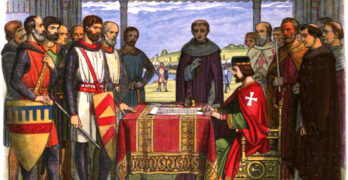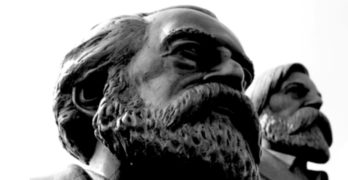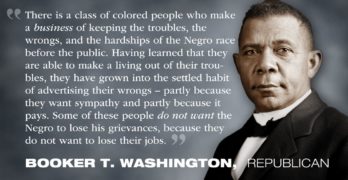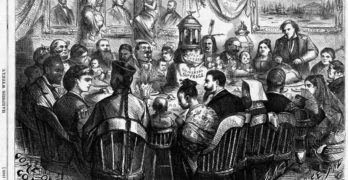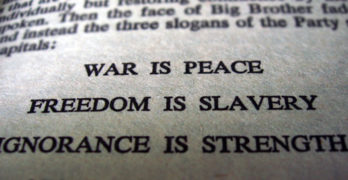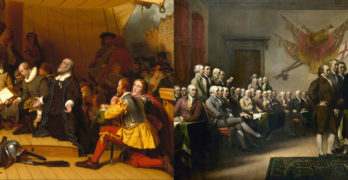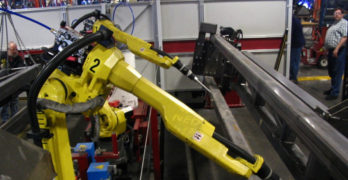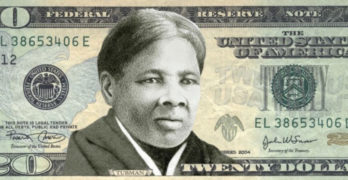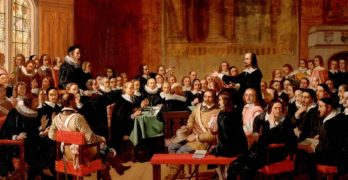
We are saved by grace and justified by faith. We are not saved by doing good deeds which is a widespread but mistaken notion, but we are saved for doing good deeds. Christians are justified by faith, but they will be judged by works because works are the fruit of faith.
For it is by free grace (God’s unmerited favor) that you are saved (delivered from judgment and made partakers of Christ’s salvation) through your faith. And this salvation is not of yourselves of your own doing, it came not through your own striving, but it is the gift of God; Not because of works not the fulfilment of the Law’s demands, lest any man should boast. It is not the result of what anyone can possibly do, so no one can pride himself in it or take glory to himself.
For we are God’s own handiwork (His workmanship), recreated in Christ Jesus, born anew that we may do those good works which God predestined (planned beforehand) for us taking paths which He prepared ahead of time, that we should walk in them living the good life which He prearranged and made ready for us to live (Ephesians 3:8-10 AMP).
We are saved to serve-and to serve indiscriminately whoever needs us, whatever their relationship or response to us. Such unconditional love has a special word in Greek: agape. This word was used in the ancient world when describing God’s love for the world expressed in Christ and the consequent love exercised by Christians, both of which included even enemies.
Jesus endorsed the second great commandment to love our neighbors as ourselves (Mark 12:31); and he interpreted neighbor to cover anyone in need whom we can help (Luke 10:27-37). Paul exhorts us:
So then, as occasion and opportunity open up to us, let us do good morally to all people not only being useful or profitable to them, but also doing what is for their spiritual good and advantage. Be mindful to be a blessing, especially to those of the household of faith those who belong to God’s family with you, the believers (Galatians 6:10).
Love of neighbours can be applied at three levels of social activity: First, in our work, business or employment. Provided it is meeting a real need in society, our daily work can and should be seen as a practical expression of neighborly love.
A successful person should be looking for people with whom they can share their own wisdom, life experiences, and skills. When you put your gift at the service of others, or when other people put their gifts at your service, together we help fulfil the great commandment of love which is to love the Lord your God with all your heart and with all your soul and with all your strength and with all your mind; and your neighbour as yourself (Luke 10:27).
Second, on welfare. Christians have a good record in voluntary service to the distressed and enhancing the living standards of humanity. They have pioneered care of the sick, the elderly, the handicapped and those who have been abandoned to their fate by our selfish society.
Though some people are accusing Christians of imposing their personal religious views on others, again we ought to remember that in America and Great Britain it was the Christians who led the fight against slavery, enacted child labor laws, opened hospitals, and ran charitable societies to aid widows, orphans, alcoholics, and prostitutes. And it is the Christians who are acting as salt and light in society today.
James, the brother of our Lord and Saviour Jesus Christ, has stimulated much of it with this definition:
External religious worship (religion as it is expressed in outward acts) that is pure and unblemished in the sight of God the Father is this: to visit and help and care for the orphans and widows in their affliction and need, and to keep oneself unspotted and uncontaminated from the world (James 1:27).
Thirdly, in reforming political and government systems, both at local and national levels. It is at this point that Christians make a real difference. While acknowledging that you cannot legislate morality, a believer can restrain evil-and, therefore, reduce suffering.
To relieve the exploited or oppressed victims of an evil system is one thing. To seek to change the system itself is another. Christians who are in a position of responsibility for others, in commerce and industry, in civil service and politics, have such an opportunity to change the system for the better as Paul exhorts us to do good to all people, as we have the opportunity (Galatians 6:10).
Those who believe in the millennial reign of Christ on earth after His return are highly motivated for social reform. For Paul tells us:
For we must all appear and be revealed as we are before the judgment seat of Christ, so that each one may receive his pay according to what he has done in the body, whether good or evil considering what his purpose and motive have been, and what he has achieved, been busy with, and given himself and his attention to accomplishing (2 Corinthians 5:10).
As with the hope for perfected individuals and a perfected church, the expectation of a perfected society stimulates the desire to make a difference in this world here and now. The certainty that one day there will be a perfect world order, spurs them to greater efforts to work for peace and justice now.
Not that we hope to achieve this, either on a universal or even national scale, before the King returns to set up His Kingdom. But we can at least demonstrate the nature of that kingdom by applying its principles to contemporary situations. This in itself commends the gospel of the kingdom mentioned by Jesus in Matthew 24:14.
Therefore, if the world is to be governed by Christians reigning with Christ and public offices are to be in their hands (for example, the law courts, 1 Corinthians 6:2), then the more experience they can gain in these positions of responsibility the better.
Anthony Ashley Cooper- Lord Shaftesbury (1801–1885)
One example of such a believer was Anthony Ashley Cooper, (pictured above) better known as Lord Shaftesbury. He entered Parliament as an evangelical Christian and soon learned how the elite were treating the lower classes of people in England.
He was shocked by the way the insane were treated and he personally toured asylums and got firsthand information on what was going on within them. He then decided to present these facts to Parliament and to convince fellow members to take action.
He profoundly influenced the social welfare system, not only of the British people but of English-speaking people everywhere, eventually becoming known as the “Great Emancipator.”
He then tackled the issue of children’s working hours which became almost a fifteen-year fight. There were many reforms that Ashley led that it would not be possible to list all of them here.
He did more perhaps than anyone else in his day to relieve the suffering caused by the ‘Industrial Revolution’ which transferred a huge population from rural to urban areas, putting them to work in factories and mines under unhealthy, even inhumane circumstances. They were simply ‘hands’ to be exploited by unscrupulous employers. His tactics were to arouse sufficient guilt in public opinion to enable legislation to be passed which limited the potential abuse.
He labored to see that Christian education was provided to “street-ragged children” at a time where there were no national schools since the time of Alfred the Great. He then pressed for improved sewage systems. There was a terrible cholera epidemic that took 50,000 lives nationwide, further justifying his cause.
He backed D. L. Moody’s efforts at evangelizing England. He enacted for a legislation to end the abominable practices of forcing half-naked women and children to haul coal and pump water for long hours in darkness. Often they were not even allowed above the ground level at all.
Due to his determination and hard work, boys were also freed from work as chimney sweeps. He fought sex slavery in which girls were sold into prostitution. Considering the minimal financial resources he had, he continued to feed starving children.
When he became Lord Shaftesbury, he built cottages and refurbished his estate that had been neglected by his selfish and self-centered father.
He advocated for better housing for the poor. On August 3, 1872, he laid the foundation stone of a large housing complex that was named after him at Battersea. He was behind the Factory Act, the Mines, and Collieries Act, the Chimney Sweep’s Act, and a number of other important legislative enactments which his tireless efforts on behalf of the working people in England have placed on the statute books of Britain.
Lord Shaftesbury was a product of the evangelical revival, but so too were other heroes who worked with him to free industrial slaves.
It should again be noted that it was changed men who changed conditions in the factories. All their endeavors were achieved by non-violent means. It was a deeply religious and Christian spirit that permeated these men. When a national conference of factory operatives was held in London shortly after the passage of the 1847 Factory Act, a great note of thanksgiving to Almighty God was given—it is quoted here by David E. Gardner:
That we are deeply grateful to Almighty God for the success which has hitherto attended our efforts, and now that the object of our labors for the last thirty years is about to be brought to a happy consummation, we pledge ourselves to promote by every means in our power those religious and social blessings which it was the object of the Bill to extend to the factory worker.
It should also be emphasized that Shaftesbury and his colleagues freed the “industrial slaves” entirely by constitutional and Christian means without a protracted strike, without a lockout, and without a civil war, and certainly without a single loss of life. All these ugly things were avoided and, because they were avoided, there is no legacy of resentment and hatred after the Factory Act had been passed. Rather, there remained a strong foundation of Christian principles, on which coming generations could build when attaining social changes in the country. In fact, Shaftesbury is given credit for possibly preventing a revolution and easing class tensions.
The 1847 Factory Act
Historians have dubbed the 1847 Factory Act as “The Magna Carta of the Industrial Worker’s Liberty.” Some of the things that were involved in the Act included the closing down of factories between the hours of 6:00 p.m. and 6:00 a.m. and the keeping of them closed between those hours so as to put a stop to all-night work. It suppressed the cunning practice of “shifts” and “relays.”
It guaranteed evening leisure, established practical immunity from Sunday labor, enforced a weekly day of rest, and won for British factory workers the Saturday half-holiday, thus providing a prolonged weekly period for recreation and sport long before any other country had even dreamed of such a benefit.
All of these social reforms were made possible by Christian men, and none of these things had been in operation before the Act was passed. In addition, the Act suppressed the practice of the free use of women and child labor.
Those who are deeply concerned about broken families today should take note of Shaftesbury’s crusade of social reform that women should be freed from the tyranny of industry, and be educated to develop homemaking to the standard of a Christian art or skill.
The Act also initiated the practice of compulsory education, and after this legislation had passed through Parliament, under Shaftesbury’s leadership, other programs of social welfare began to flow from it. There were many friendly and benefit societies, and a hundred self-help and cooperative movements that sprang into being, as well as workers institutes, temperance guilds, literacy and debating societies, and the self-governing British trade union movement.
The Great Lesson
The great lesson that the eighteenth-century awakening teaches us, therefore, is that the souls of men had to first be awakened and regenerated before all these social reforms could be set in motion. The hearts of individuals were changed first when the Christian gospel was preached in the power of the Holy Spirit. Then changed people began to change their society. That is the order in which things happened and it is what we need today.
Like all other reformists, Shaftesbury had a conviction that Christ must be the center of a living faith. He preached Christ and the people did not mock him for his beliefs, but listened intently and with respect. Non-conformist chapels were established all over the country, and the British trade union movement grew out of these very chapels.
Shaftesbury Memorial and the Statue of Eros

Piccadilly Circus in 2016, with the fountain in the foreground. Source Wikimedia
At the south-western side of Piccadilly Circus stands the Shaftesbury Monument Memorial Fountain. It serves as an abiding testimony to the eighteenth-century evangelical revival that freed the factory workers of England. It was moved after World War II from its original position in the center and was erected in 1892–1893 as a memorial to the philanthropic works of Lord Shaftesbury.
The monument depicts an arrow of a winged statue of an archer, which is sometimes referred to as the Angel of Christian Charity.
Though it is known as Eros, which is the mythical Greek god of love, others have also felt that it was too sensual and quite inappropriate to commemorate such a respectable person as Shaftesbury. But we should not lose its original meaning, which signified the great work of Shaftesbury and all that he did to obtain the emancipation of his fellow men from poor working conditions.
According to one expert, the statue most importantly depicts an arrow of Christian love piercing the world, which is what Shaftesbury’s love for his fellow men sought to do.
Few are aware that behind these public endeavors lay a constant and conscious expectation of Christ’s return to rule for which Shaftesbury sought to be ready. At the top of every letter he wrote were these words: Even so, come Lord Jesus, a prayer to be found on the last page of the Bible (Revelation 22:20).
Source of Image: Forgotten Podcast









